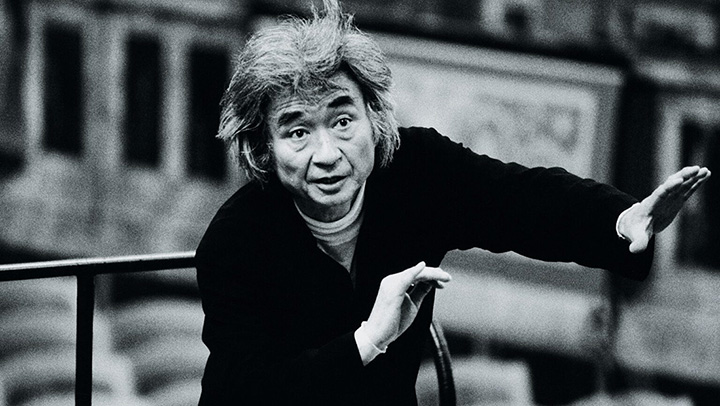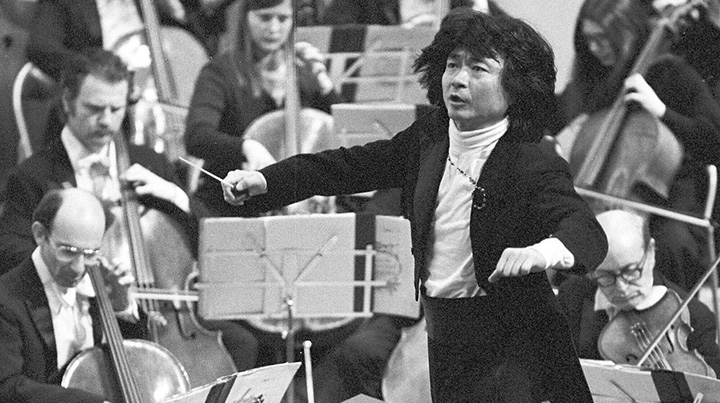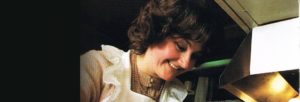Although Ozawa’s towering reputation stands on his mastery over a vast orchestral repertoire, his affinity with Tchaikovsky’s drama was palpable throughout his urgent and absorbing interpretation. Despite any inconsistencies from his cast’s vocal performances, Ozawa’s ability to exact a full spectrum of dynamics and instrumental nuances from the Met orchestra was revelatory as he unearthed the romantic yearning, superstitious enigmas, and febrile neuroses contained within this atmospherically multi-faceted work.
The occasion of Ozawa’s passing in February 2024 prompted me to revisit the considerable discography he amassed over his illustrious six-decade career. While the conductor minted celebrated readings of the Germanic staples (his Mahler symphonies with the Boston Symphony and Saito Kinen Orchestras are remarkable), his artistic strengths undeniably lie in his distinguished recordings of French and modernist composers.
Ozawa’s explorations of works by Berlioz (his near definitive Roméo et Juliette), Ravel (his Daphnis et Chloécan stand proud beside those by Charles Munch), and Fauré (his mesmerizing Pelléas et Mélisande) benefited greatly from his penchant for elegance, luminous and sensuous orchestral textures, and fluent, articulate tempi. As his discography progressed into the 20th century, the vitality he infused into his precise layering of complex orchestrations imbues his Messiaen, Stravinsky, and Bartók with an impactful emotional resonance, a quality that eludes the cooler aesthetic favored by contemporaries like Pierre Boulez.
If Seiji Ozawa is less renowned for his work in opera, a survey of his full recorded legacy’s broadcasts and studio projects reveals his gifts for channeling his impeccable musical standards into the dramatic kernel of theatrical music. Despite assertions of his late entry into opera, Ozawa as early as the 1960s had already guest conducted at important festivals and theaters, decades before he crowned his career with his tenure as the longest-serving artistic director of the Wiener Staatsoper.
Outside of his documented concert operas with the Boston Symphony, other notable broadcasts that exemplify this conductor’s lifelong affinity with opera include his Così fan tutte (1969) and Idomeneo (1990) from the Salzburg Festival, a gripping Dialogues des Carmélites (1999) from Paris, and a clutch of remarkable broadcasts from Vienna that include a landmark presentation of Ernst Krenek’s Jonny Spielt Auf and an exciting Der Fliegende Holländer that features Nina Stemme’s powerful Senta.
Many publications that recently commemorated this great artist’s life have spotlighted his prodigious discography’s memorable orchestral recordings. Because parterre box is an opera- and voice-oriented forum, this article will pay tribute to the eminent conductor through five of his most distinctive and unreservedly commendable contributions to this art form.
- Richard Strauss’s Elektra; Boston Symphony Orchestra (1988)
Ozawa’s Elektra on Philips grew out of his collaboration with Hildegard Behrens during her 1987 Paris debut of Richard Strauss’ quintessential dramatic soprano part. A year later, Behrens and Christa Ludwig reprised their readings of Elektra and Klytämnestra with the conductor’s own Boston Symphony Orchestra, who capably delivered Strauss’ demanding score with an abundance of histrionic force. While Ozawa’s Elektradoesn’t immediately thrum with the nervous intensity familiar from this opera’s most celebrated recordings, what it emphasizes is a diaphanous sheen that recalls the composer’s direction to render the instrumentation like Mendelssohn’s fairy music. However, this lyrical recording of Elektra doesn’t stint on tension, steadily accumulating the lunacy and the mania until the drama reaches its inexorable climax. Behrens’s 1988 Elektra, caught before her focused diet of heroic roles stripped her soprano’s freshness and ease, is inward, detailed, and dramatically riveting. Christa Ludwig creates a Klytämnestra shorn of caricature, a musical conception that chills for the danger implicit in her specific sculpting of the phrases. If Ozawa’s Elektra isn’t the most harrowingly intense choice in the discography, it is an intelligent one that can enthrall for its psychologically nuanced dramatics.
- Arnold Schönberg’s Gurrelieder; Boston Symphony Orchestra (1979)
Arnold Schönberg’s sumptuously orchestrated oratorio has been graced with a most auspicious discography in the century since its score’s publication. While celebrated artists like Leopold Stokowski, Pierre Boulez, Riccardo Chailly and Esa-Pekka Salonen have immortalized persuasive interpretations on record, Seiji Ozawa’s 1979 reading with his Boston orchestra easily rises to the top of the discography. He not only boasts the finest and most richly endowed vocalists (Jessye Norman as Tove, Tatiana Troyanos as the Waldtaube, James McCracken as Waldemar and Werner Klemperer’s eloquent Speaker), but also brings tremendous excitement to a score that can easily derail into a meandering exercise in the art of impressionistic detailing. Ozawa balances his skill for terracing a wealth of instrumental detail with a propulsive drive and power that eclipses the competition. Finer inner details and more vivid sound imagery may be experienced from other Gurrelieder, but Ozawa’s satisfies and thrills for balancing the Apollonian and Dionysian dualities of Schönberg’s writing.
- Igor Stravinsky’s Oedipus Rex; Saito Kinen Orchestra (1993)
Ozawa’s discography features two versions of Stravinsky’s stark Latin opera-oratorio Oedipus Rex. Both were recorded by Philips and are founded on a staged production conceived by Julie Taymor for the Saito Kinen Festival of 1992. The video of the production undisputedly recommends itself, not only for supplying the visuals needed to engage the sense of ritual and atmosphere contained within Stravinsky’s writing, but moreover for Philip Langridge’s heroic Oedipus. Ozawa’s vision may be decidedly lush and romantic, but he never skirts the harrowing drama and the dread that permeate the score, and his Saito Kinen Orchestra and Shinya Kan Chorus respond in kind with meticulous attention to detail. Jessye Norman’s opulent Jocasta commands attention and represents another of this set’s compelling elements.
- Francis Poulenc’s Les Mamelles de Tirésias; Saito Kinen Orchestra (1998)
Like many conductors who did not originate in the theater, Ozawa cut his teeth into the operatic genre with one-act miniatures that became increasingly popular among 20th century composers. Although Ozawa won a Grammy award for his 2015 recording of Ravel’s L’enfant et les sortilèges, that statement doesn’t necessarily represent his finest take on the opera (a 1979 broadcast from Paris is ravishing and easily betters the latter for theatricality). Rather, his discography’s most singularly captivating recording from that musical period hails from the 1998 Saito Kinen Festival’s presentation of Poulenc’s Les Mamelles de Tirésias. Ozawa and his multinational ensemble effervesce and bring out the vaudevillian essence in Poulenc’s absurdist farce about gender reversal and procreation. If Barbara Bonney’s Thérèse/Tirésias doesn’t consistently sound idiomatic, her singing is gorgeous, the remainder of the Francophone cast is a delight, and the Saito Kinen Orchestra’s execution of this score proves it a worthy and authoritative successor to André Cluytens’s pioneering recording.
- Olivier Messiaen’s Saint François d’Assise; Opéra National de Paris (1983)
Seiji Ozawa was a renowned Messiaen specialist and advocate, such that the avant-garde composer in his final decades entrusted the conductor with the premiere of his magnum opus, Saint François d’Assise. Olivier Messiaen’s meditative opera contains signatures of his timbrally fascinating idiom–his mimicry of avian sounds, his modal inventions, and his coloristic and rhythmic inspirations from Stravinsky and Debussy–all elements of which were foregrounded and detailed exceptionally by Ozawa during its premiere. While Kent Nagano’s later recording from Salzburg executed the technical demands with astonishing finish, the elder stateman along with the younger José Van Dam vividly recreated Messiaen’s frescoes of St. Francis’s life while evoking the score’s rich Catholic mysticism.





